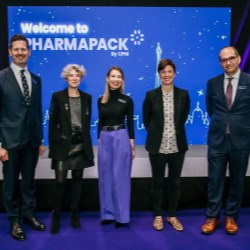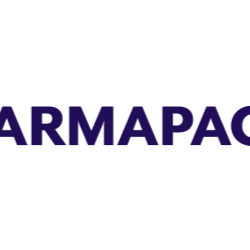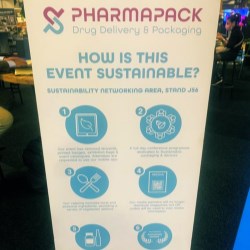Public
PharmaPack Europe Events
PharmaPack Europe Locations
PharmaPack Europe News
Pharmapack Europe Videos
If this is your company, CONTACT US to activate Packbase™ software to build your portal.
Amsterdam, 09 October 2020: The second part of the 2020 CPhI Annual Report predicts significant market changes for digital adoption and global generic consumption by 2025. The new findings are released as the industry prepares to meet virtually at the CPhI Festival of Pharma, and suggest that digital technologies will help deliver lower healthcare costs through telemedicine and bring innovator-like approaches for generic companies.
CPhI experts Bikash Chatterjee, CEO at Pharmatech Associates and Aurelio Arias, Engagement Manager, Thought Leadership, IQVIA explore the longer-term implications of slowing growth in the generics market – with many products coming off-patent – and how digital solutions are transforming health and pharma structures.
Chatterjee suggests that patient centricity is no longer just a buzzword and change is accelerating. Telemedicine and, in particular virtual GP appointments, will be one lasting legacy of the pandemic, but payers and insurance companies will have to adapt payment structures to reflect the new reality. “By 2025, telemedicine and patient participation in routine healthcare will be the norm in the U.S. The EU will be close behind, even if GDPR represents a significant compliance hurdle, as does the 2013 transparency legislation in the EU. Pharma will bring a more mature component of its R&D framework to analyze and harvest treatment information from telemedicine databases”.
In terms of harnessing data, Chatterjee predicts we will see voice collection of data in the home now begin to be incorporated into both home and health settings. Chatterjee added, “In April 2019, Amazon unveiled their secure software solution toolkit that allows health care companies to build Alexa voice tools capable of securely transmitting private patient information — a move that opens the door to a broad array of uses in homes and hospitals.”
These changes are gradually establishing the patient – not the care giver – as the ultimate customer of pharmaceutical interventions, and integration of personal devices will transform remote monitoring for doctors and decentralized clinical trials.
Arias foresees technology helping transform the approach of generic and biogeneric companies by 2025. In his analysis, he identifies that many generic companies will need to look at alternate strategies to maintain growth, switching from volume alone to innovative approaches that deliver greater patient value. Growth in the last few years has been driven by increases in volume consumption in emerging economies, but generics will now have to offer additional value-added benefits.
This, coupled with a sustained economic downturn, means biosimilar encroachment will have to increase in Western countries, where big savings need to be delivered. Arias comments, “North-Western European countries, especially the Nordics, UK and Germany, have historically shown immediate entry and rapid uptake of biosimilars so they are well poised to generate the greatest savings by 2025. There are a couple of large biologics approaching expiry over the next few years such as Eylea and Stelara. These will be focus areas for EU healthcare systems. The US however, will see the biggest saving of all when Humira exclusivity runs out in 2023. Currently there are around 8 biosimilar candidates lined up ready for launch in that year and this unprecedented level of competition will likely generate the highest savings.”
The result of the competition will be that generic companies will increasingly need to offer value-added approaches, as well as comparable reference products, to secure competitive advantages. Arias added, “It is likely that we'll see an increasing number of specialist generics and biosimilars companies that focus predominantly on innovation. For example, Celltrion have explicitly stated that they will increase their focus on biobetters and have recently announced trials on an oral biologic. Generics in five years’ time could indeed come in many forms but the regulatory and payer environment will have to recognize and support them along the way.”
By 2025, 56% of newly genericised drugs will be small molecules, and Arias states the speciality generics market, which accounts for the bulk of the value, should focus on reducing administration complexity and adding a digital layer to their therapeutic offering helping patients manage therapies.
The report also suggested tomorrow’s off-patent leaders will be manufacturers who begin to behave in the way innovators do. Investing in patient-centric product design, engaging stakeholders, generating real world evidence and partnering with MedTech start-ups. This will allow them to align their products closer to patient needs and in doing so, create efficiencies in healthcare provision.
Consequently, some of the largest generics and biosimilars companies are already actively exploring innovative strategies as a source for continuing growth. Relying on volume increase alone cannot sustain their size. Behaving like innovators offers avenues for growth, but gaining reimbursement for their efforts will be challenging if they struggle to communicate additional value to payers. Some originators will be able to compete on price with their referenced copies, yet this still leaves scope for an innovator to improve upon any originator product.
Tara Dougal, head of content at CPhI Festival of Pharma, commented: “Patient centricity and how technology will be integrated into therapies has been rapidly accelerated because of COVID. With generics coming off-patent, these will also become product USPs that drive growth in the years ahead. In fact, Aurelio will be presenting a roundtable on ‘Patient Centricity’ and we will have talks with expert on cross-sector collaboration as technology empowers pharma to reimagine the art of the possible.”
To download a copy of the first part of the CPhI Annual Report, please visit Global Pharma Insights. Aurelio Arias will host the roundtable webinar Patient Centricity – beyond the buzzword [Monday 12th, October), with a webinar on Cross-section collaboration: the enormous potential for pharma and tech [Friday 9th, October].
CPhI Annual Report expert summaries:
Bikash Chatterjee, CEO of Pharmatech Associates
Trends in patient centricity: adopting a patient centric model in healthcare
- Patient centricity will be a driving force in the changing healthcare landscape throughout the next 2-3 years
- Rapid uptake of smart devices and telemedicine will be a lasting impact of the pandemic
- Voice data collection will gradually be adopted in the home and healthcare setting as part of the new data-driven healthcare culture
- Healthcare companies will look to develop voice tools for secure transmission of private patient information following Amazon’s unveiling of their software solution toolkit in April 2019
- Telemedicine in routine healthcare will be the norm in the US by 2025, whilst the EU will trail closely behind with regards to its usage
- Wide-scale use of telemedicine in developed economies will result in gradual adoption of telemedicine in emerging economies, where it will have the greatest positive impact
Aurelio Arias, Thought Leadership, IQVIA
Future trends in the off-patent sector
- Decreasing volume demand for off-patent drugs, increasing competition and more competitive pricing, and supply chain fragility are currently the biggest challenges that the off-patent industry is facing
- The biggest opportunities for growth in the off-patent market are in developing specialty generics, digital value-added medicines and biobetters
- Manufacturing of high volume, low complexity products will remain in the East unless US and EU policies are put in place to guarantee minimum local production in response to COVID-19
- 56% of newly genericized drugs will be small molecules by 2025, with most of this value coming from specialty medicines
- Emerging markets will be expected to drive growth of the off-patent market from 2025 onwards, albeit at a slower rate than before
-ENDS-
Notes to editors
About CPhI
CPhI drives growth and innovation at every step of the global pharmaceutical supply chain from drug discovery to finished dosage. Through exhibitions, conferences and online communities, CPhI brings together more than 100,000 pharmaceutical professionals each year to network, identify business opportunities and expand the global market. CPhI hosts events in Europe, Korea, China, India, Japan, South East Asia, North America, and the Middle East and Africa. Co-locating with ICSE for contract services; P-MEC for machinery, equipment & technology; InnoPack for pharmaceutical packaging; bioLIVE for biopharma; and Finished Dosage Formulation for every aspect of the finished dosage supply chain. CPhI provides an online buyer and supplier directory at CPhI-Online.com.
For more information visit https://www.cphi.com
About Informa Markets
Informa Markets creates platforms for industries and specialist markets to trade, innovate and grow. Our portfolio is comprised of more than 550 international B2B events and brands in markets including Healthcare & Pharmaceuticals, Infrastructure, Construction & Real Estate, Fashion & Apparel, Hospitality, Food & Beverage, and Health & Nutrition, among others. We provide customers and partners around the globe with opportunities to engage, experience and do business through face-to-face exhibitions, specialist digital content and actionable data solutions. As the world’s leading exhibitions organizer, we bring a diverse range of specialist markets to life, unlocking opportunities and helping them to thrive 365 days of the year.
For more information, please visit www.informamarkets.com.
The Informa Markets annual schedule of Pharmaceutical eventsnclude: CPhI & P-MEC China 2020 (16–18 December 2020 (Virtual)); CPhI & P-MEC India 2020 (28–29 January 2021 at the India Expo Mart, Greater Noida, Delhi NCR – Delhi, India); CPhI Japan (14-16 April, 2021 at the Big Sight Exhibition Centre – Tokyo, Japan); Pharmapack Europe 2021 (19-20 May, 2021 at the Paris Expo, Porte de Versailles – Paris, France); CPhI and P-MEC China 2021 (22-24 June, 2021 at SNIEC – Shanghai, China); CPhI South East Asia (4-6 August, 2021 at Challenger 2, IMPACT, Muang Thong Thani, Thailand); CPhI North America (10 August - 12 August, 2021 at Pennsylvania Convention Centre – Philadelphia, USA); CPhI, ICSE, P-MEC, FDF, InnoPack Worldwide, BioProduction (31 August – 2 September 2021 at Fiera Milano, Milan); CPhI Middle East & Africa (26-28 September, 2021 at the Riyadh International Convention & Exhibition Center, Riyadh, Saudi Arabia); CPhI Korea (11-13 August 2021), COEX – Seoul, Korea); CPhI & P-MEC India 2021 (23–25 January 2021 at the India Expo Mart, Greater Noida, Delhi NCR – Delhi, India);
For media enquiries, please contact:
Alex Heeley or Abdul Khalifeh
De Facto Communications
T: +44 (0) 203 735 8168























